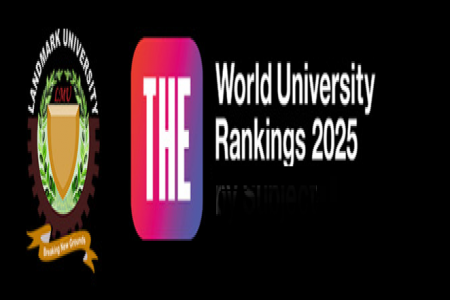
Story of the week
Revitalizing micro, small and medium enterprises for sustainable development in the 21st-century workplace and tackling contemporary issues in management were some of the key grey areas of discussion at the maiden Landmark University International Conference on Management, Business and Entrepreneurship (LU-ICMBE) 2021 organized by the Department of Business Studies between 19th and 20th of May, 2021.
The two-day academic engagement attracted about a hundred physical and virtual participants from management and other social science fields to elucidate the theme, “Revitalizing Developing Economies towards Achieving Sustainable Development Goals (SDGs): Post Covid-19”.
Declaring the conference open during his address, the Vice-Chancellor, Professor Olaniyi Adeyanju who was represented by the Dean, School of Postgraduate Studies, Professor Charity Aremu, accentuated the uniqueness of the conference which he said lies in its capacity to engender the hope of recovering the world from the stronghold of the effect of COVID-19 by aligning with the provisions of the Sustainable Development Goals for delivery. According to the Vice-Chancellor, the economic challenges of the nation have defiled both domestic and international containment measures thereby putting many under so many unbearable conditions. He beckoned on all participants to maximise the platform the conference provided to proffer solution to the global economic challenges thereby making the gathering impactful. He enthused that, “to fold our hands and do nothing is to agree with the status quo, which is distressing and horrifying”.
Quoting the Chancellor of Landmark University, Dr David Oyedepo, Professor Olayanju said, “until we succeed in producing indigenous solution, we will never get to where we are going, and it is very clear that United Nations will not take up any nation’s responsibility. Stopping economic issues are your responsibility”. Professor Olayanju thereafter expressed optimism that the conference would produce the needed solution to the world challenges as part of Landmark’s strategic drive towards fulfilling the tripodal mandates of a university which are teaching, research and community impact.
In their efforts to provide the indigenous perspectives on the revitalization of the developing economies, the Registrar, Landmark University, Miss Fola Oyinloye who was one of the discussants, identified some factors that could make us a better nation, which include bridging the gap of inequalities at different levels, provision of basic amenities, minimizing pollution, promoting a green environment, and promotion of justice and equity. In the same vein, she advocated adequate projection of the SDGs objectives at all levels down to the rural areas, thereby erasing ambiguity for overall participation towards the actualization of the goals. Miss Oyinloye also indicated that corruption at all levels has been a major bane to the development of economies in the African continent. She further stated that corruption is not only financial, it manifests also each time we breach equity or due process, and practice favouritism. She, therefore, submitted that a better economy and country would emerge if corruption is nipped in the bud.
In furtherance of the discourse, the Keynote Speakers, Professors Muritala Awodun and Emmanuel Adegbite stressed the need for immediate implementation of actionable policies that would translate to the reality of the sustainable goals. The immediate past chairman, Kwara State Inland Revenue Services (KWIRS) and founder of Fifty-fifty Institute, Professor Muritala Awodun noted that there is a need to balance social sustainability (food, security and shelter) and economic sustainability in the post-covid-19 era. On the SDGs, Professor Awodun opined that each nation must consider how to achieve the set target without losing time. According to him, government and private sectors, as well as non-governmental organizations, must rethink strategies to achieve the SDGs. Professor Awodun further stated that there is a need to address poverty which is more of micro than macro when addressing the revitalization of developing economies through the SDGs. He added that rather than relying on the government for the actualization of SDGs, individuals from each family should be intentional and proactive in achieving the SDGs even in their daily activities. He, therefore, identified partnership between public and private sectors for all SDGs as a solution to revitalize the nation’s economy in stead of relying on the United Nations for foreign aides.
While speaking on “Prosperous CSR in post-COVID in Nigeria”, the Nottingham University Business School Professor Emmanuel Adegbite highlighted the positive and negative effects of Corporate Social Responsibility (CRS) in challenging and non-enabling institutional contexts on the economy.
Other Discussants, Dr Damiant Eke of the Montfort University, UK and Dr Bamidele-Oshinowo of the University of Lagos also in their papers proffered solutions towards reawakening the nation’s economy as they urged stakeholders to formulate policies that would reassure the citizenry through the SDGs projects.
The first international conference featured six-track sessions of paper presentations by participants both physically and virtually. The highlight of the conference was the presentation of an award of participation to the two keynote speakers.
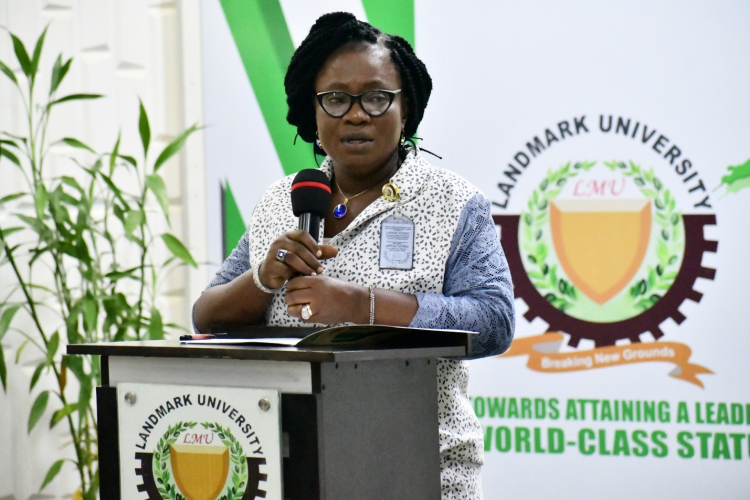
DSPS, Professor Charity Aremu representing the Vice-Chancellor, Professor Adeniyi Olayanju at the conference

The Registrar, Landmark University, Miss Fola Oyinloye presenting her paper at the conference

The Keynote Speaker, Professor Muritala Awodun, during his presentation

Professor Emmanuel Adegbite while delivering his keynote address
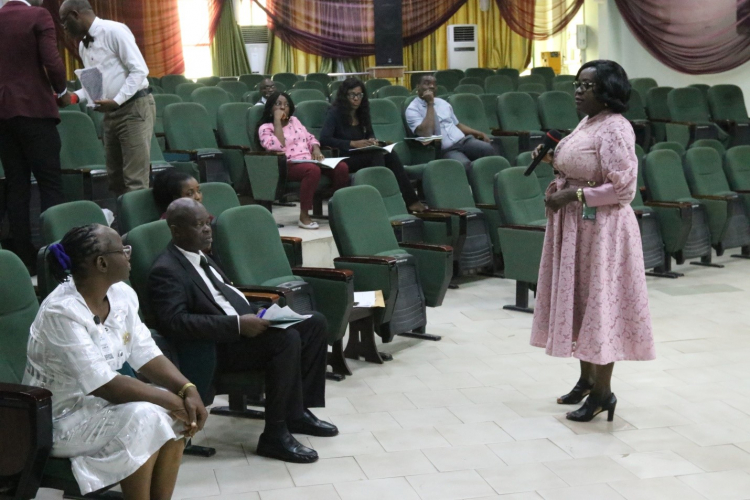
The Registrar while answering some questions

The Registrar, Miss Fola Oyinloye with the Dean CBS, Dr Festus Asamu and HOD Business Studies, Dr Sunday Eze and the LOC

The Dean, College of Business and Social Science, Dr Festus Asamu while delivering his welcome address at the conference
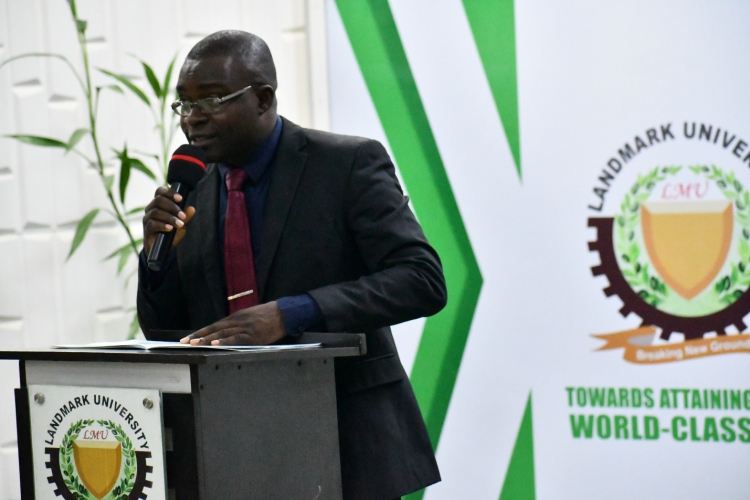
HOD Business Studies, Dr Sunday Eze while delivering his address
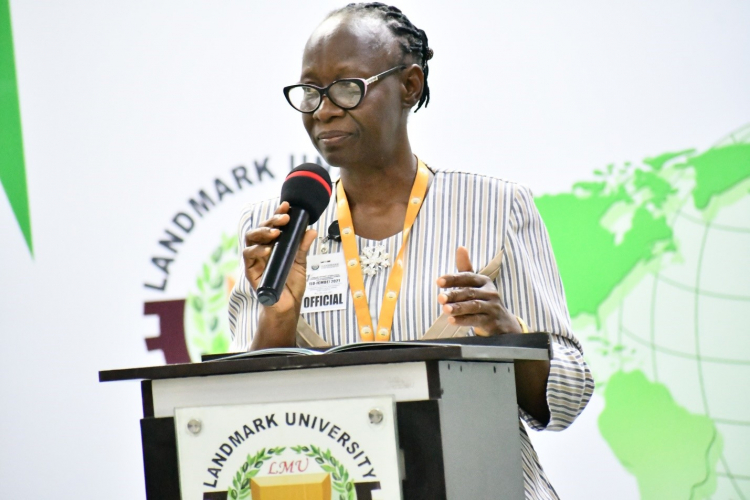
The Chairperson, Local Organizing Committee, Dr Mrs Mercy Adeyeye while delivering her address
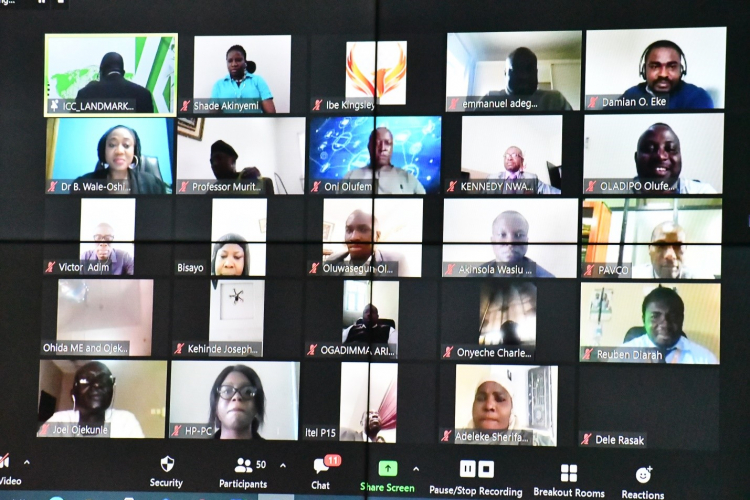
A cross session of online participants

The Dean, College of Social Science, Dr Festus Asamu in a group photograph with members of the Local Organizing Committee, and some of the participant
Get the latest news and updates by signing up to our daily newsletter.

Story of the week